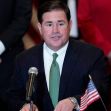On Monday, Arizona joined a growing number of states refusing to allow vaccine passports in their jurisdictions, should they be developed. Governor Doug Ducey signed an Executive Order banning all state or local government agencies and any business that performs public services from using vaccine passports as an entry requirement to facilities, or as a prerequisite to receiving services from those entities. While there has not been a vaccine passport or any vaccine verification documentation developed within the state, Arizona has proactively preempted implementation of any verification documentation. Instead, the Governor is prioritizing an individual's choice to vaccinate.
According to the Executive Order signed on April 19, all state agencies, counties, cities, and towns are banned from “requir[ing] an individual to provide documentation regarding the individual’s COVID-19 vaccination status” to enter a facility or receive any “service, permit, license, or other work authorization requirements.”
The Executive Order also restricts businesses from requiring documentation from their customers for entering or receiving services if the business receives public funds from the State of Arizona or is contracted by the state to provide public services. However, other private businesses, schools, and healthcare institutions licensed under Arizona Revised Statutes Title 36 are not prohibited from requiring such vaccination documentation from customers, students, patients, or visitors.
In a press release, Governor Ducey remarked that the state “strongly recommend[s] all Arizonans [to] get the COVID-19 vaccine, it’s not mandated – and it never will be. Vaccination is up to each individual, not the government.”
Since the first COVID-19 vaccine received emergency use authorization in the United States, the idea of how to prove an individual has been vaccinated against the virus has floated through media articles and government talking points. A “Vaccine Passport,” or a vaccination verification mechanism, would allow individuals to safely return to a more normal lifestyle in their community and resume international travel.
There have been many advocates against the idea of enforcing a so-called “vaccine passport,” with the largest argument accumulating around an individual’s privacy of their medical information. In a statement released by the Office of the Governor, Ducey agreed with this assessment when he implied that having a “vaccine passport” would inherently require individuals to share private medical information.
Six states, all with Republican governors, including Montana, Idaho, Texas, Florida, Utah, and now Arizona, bring up yet another argument against enforcing documentation. Not only are they promoting the safeguarding of a person’s right to privacy, but state officials are also promoting an individual’s right to choose. Montana’s Governor, Greg Gianforte, echoed the sentiment re-iterating that a vaccine is “entirely voluntary.” Similarly, Idaho Governor, Brad Little, stated the government “should not violate Idahoans’ personal freedoms by requiring them to receive [the vaccine].”
On the other side of the spectrum, some states are actively promoting or developing a verification process. New York, for example, was the first state to formally launch a vaccine passport, called the “Excelsior Pass,” a smartphone app used for New Yorkers to enter events and businesses.
California is also encouraging venues to require some sort of proof of vaccination to either enter or receive services through incentives to reopen. However, California is against labeling any type of proof a “vaccine passport.”
Individual states and private businesses are free to develop and implement a vaccination verification program. However, last week, White House Press Secretary Jen Psaki stated the federal government will not support the development of a nationwide vaccine passport, saying the White House “is not now, nor will we be, supporting a system that requires Americans to carry a credential.”






